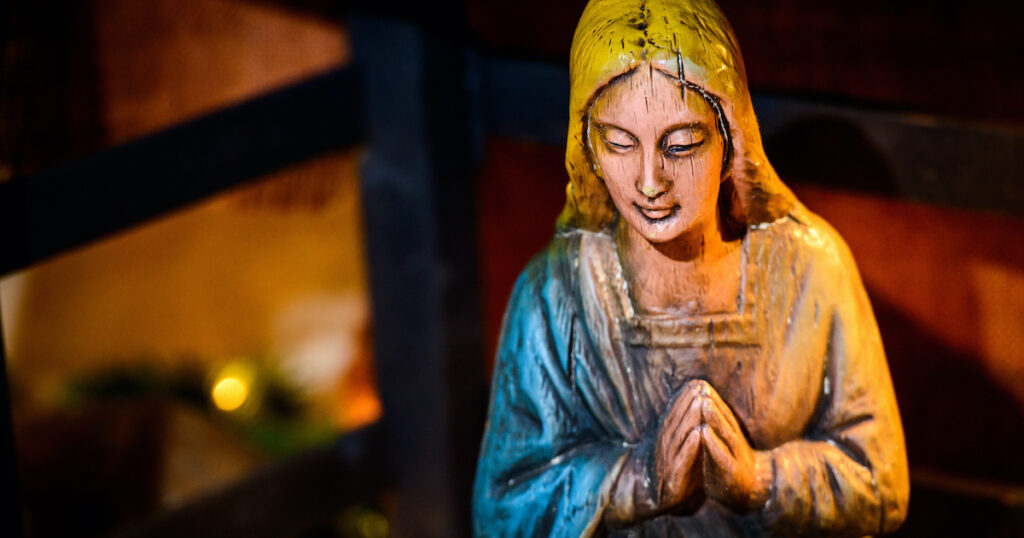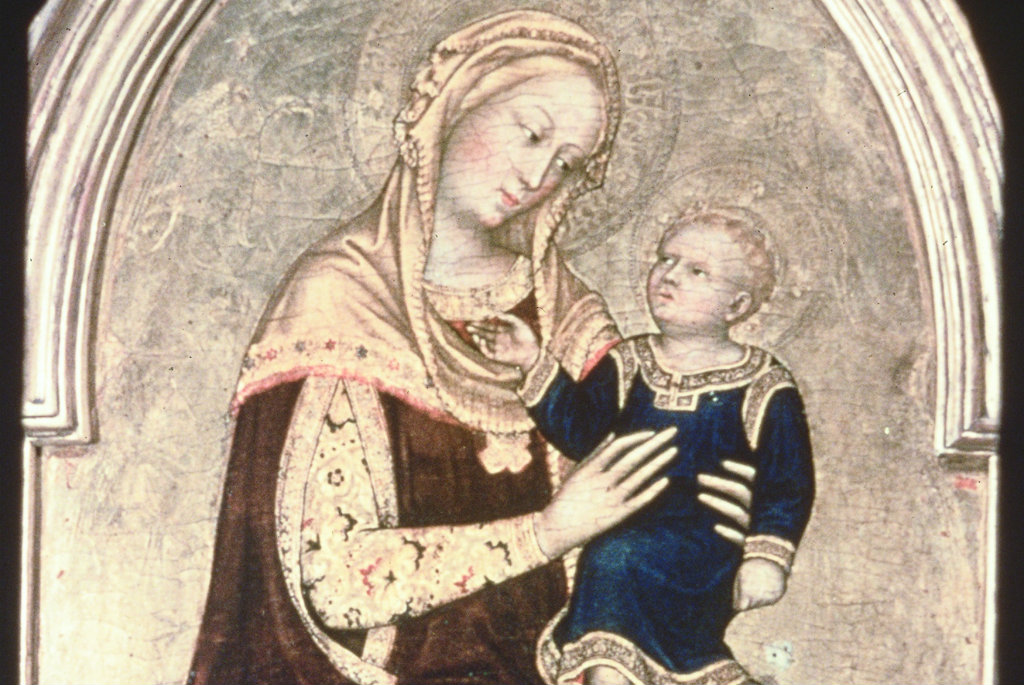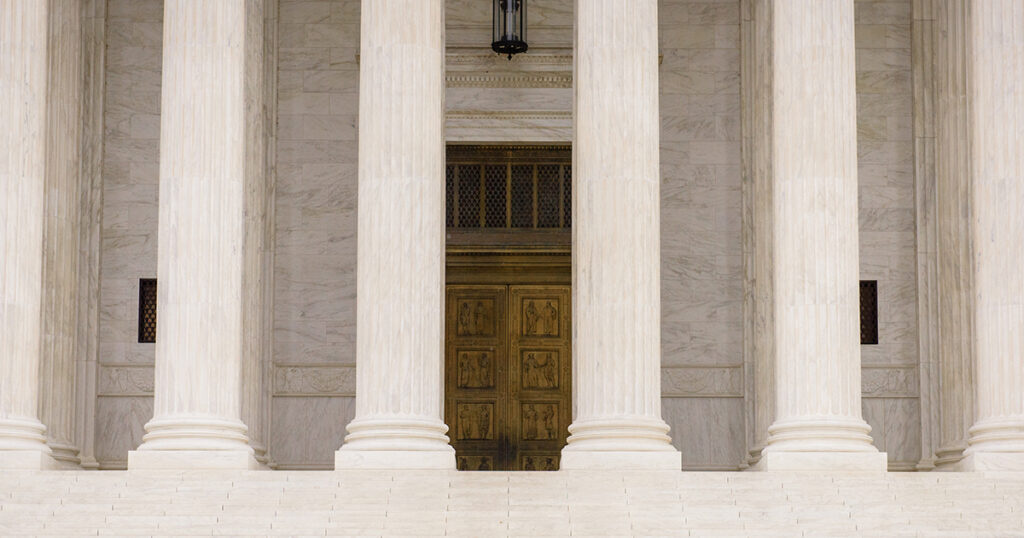A Mother’s Perspective on the Annunciation
“And Mary said, ‘Behold, I am the servant of the Lord; let it be to me according to your word.’ And the angel departed from her.”
(Luke 1:38)
I was a lowly, 23-year-old graduate student when I found out I was expecting my first child. My husband was months away from entering seminary. We were young, dumb and barely making ends meet week to week. I sometimes joke now that our beautiful eldest daughter was born about two years premature, but I didn’t laugh then. Standing in the tiny bathroom of our 600-square-foot rental, I cried. It was all so much, so fast.
How can this be? I thought (already a hormone-drenched mess of emotions). How can God possibly think that we’re ready for this? My husband, smiling broadly, held me until the sobs subsided, and together we began making plans to welcome our little one.
And then, the next day, I got up, drove to campus, attended class, graded papers, went shopping, made dinner, watched TV, tidied up, did my homework and went to bed — just like always.
Inside, everything had changed. Outside, nothing had. A miracle was happening, and nobody knew it but my husband and me.
‘Greetings, O favored one’
I can’t help recalling those surreal early days of pregnancy whenever I read the text from Luke 1 that corresponds to the Feast of the Annunciation on March 25: “In the sixth month the angel Gabriel was sent from God to a city of Galilee named Nazareth, to a virgin betrothed to a man whose name was Joseph, of the house of David. And the virgin’s name was Mary. And he came to her and said, ‘Greetings, O favored one, the Lord is with you!’” (Luke1:26–28).
I wonder what was going through Mary’s mind while the angel spoke to her. She was “troubled,” yes, and humbly receptive to the word. But did she smile? Did she cry? Was she overwhelmed and terrified by what lay ahead? Overjoyed to bring new life — and what life! — into the world? A little relieved, perhaps, to have a little time alone with her secret, before her belly would blossom and reveal her condition to all around her?
I wonder, too, what life was like for her just after the angel departed. The truth of what had just happened — the eternal Son of God becoming incarnate as a human embryo — would one day turn the world upside down. But not now. Not yet. In that moment, no one else on earth yet knew what was happening. Even her fiancé was entirely in the dark.
In heaven, the news was no doubt ringing off the walls: “It’s go time! The Son of Man has descended. The Lord is working salvation with His mighty arm!” But on earth, things were whisper-quiet. Until John, that great prenatal prophet, bore witness to Christ’s presence with his intrauterine acrobatics, no one knew but Mary herself. She rose and slept, ate and drank, worked and rested, then “arose and went with haste into the hill country” to see her cousin (Luke 1:39), all while the Savior of the universe grew silently within her.
Pondering Mary’s pregnancy makes me think back on my own and wonder: Did Mary have morning sickness? Ligament pain? Fatigue? Did she wake up one day and notice that everything tasted strangely like metal? Did her back ache? Did her feet swell? Did her gums bleed? Did she ever muse (as so many of us have) about whether her baby was currently closer to the size of a kumquat or a fig?
Though Scripture does not say so, I like to think she experienced all these familiar hallmarks of pregnancy and more. Why wouldn’t she? She was the fully human mother of a fully human baby. Like every other child of Adam and Eve — like Mary, like Joseph, like you, like me — our blessed Lord and Savior can sing with full voice the words of Psalm 139:
For you formed my inward parts;
(Psalm 139:13–16)
you knitted me together in my mother’s womb.
I praise you, for I am fearfully and wonderfully made.
Wonderful are your works;
my soul knows it very well.
My frame was not hidden from you,
when I was being made in secret,
intricately woven in the depths of the earth.
Your eyes saw my unformed substance;
in your book were written, every one of them,
the days that were formed for me,
when as yet there was none of them.
We confess this truth boldly in our creeds: “I believe … in one Lord Jesus Christ … who for us men and for our salvation came down from heaven and was incarnate by the Holy Spirit of the virgin Mary and was made man” (Lutheran Service Book, p. 191).
Celebrating ‘God with us’
From the moment the angel spoke the Word and Mary received it, Christ “was made man.” From the Annunciation onward, “God with us” has been with us.
Given all this, I sometimes wonder why the Feast of the Annunciation doesn’t get any more attention on our church calendars. Could our relative disinterest in the Annunciation be part of a larger, lingering backlash against the veneration of Mary in the Roman Catholic Church? Could it be that the noise of Christmas — with all those holly jolly carols and ringing sleighbells — has drowned out every other commemoration of Christ’s Incarnation? Is it that we don’t take seriously enough the prenatal life of the Savior? (Surely not! Medieval Christians [who generally believed that life did not begin until a baby’s “quickening” — when the first kicks are felt at around five months] placed such a heavy emphasis on the Annunciation that in many parts of Europe, New Year’s Day was celebrated annually on March 25. Certainly, with our advanced understanding of prenatal science, we have no cause to be less enthusiastic than they were.) Could it simply be that the Annunciation falls smack dab in the middle of Lent, when our faces are firmly set toward Jerusalem, not Nazareth?
Whatever the reason, there’s no denying that we don’t tend to make much of the Annunciation.
Perhaps, though, as pro-life, creed-confessing Lutherans, we should.
My life as a mother began not in a delivery room, but in a bathroom. Mary’s life as a mother began not in Bethlehem, but in Nazareth. It was there that “the Word became flesh and dwelt among us” (John 1:14) — there that Jesus’ long road to the cross began.
That, surely, is worth commemorating.






I’ve never thought of this before, and prob. never will again, but whatever the true answer is I’m Sure GOD,saw to it that Mary felt what she was suppose to. God Bless Our Lord.!
I agree with you that the Protestant knee jerk response to the Catholic veneration of Mary was too extreme. Mary did not ask to be worshipped or venerated, or raised to the level of “co-redemptress” as some practitioners of Catholicism enthusiastically promoted. Mary held a special place in the redemption story, as the earthly instrument God used to bring His Son into the world. Without worshipping her, or seeing her as an “intermediary” between mortals and Christ, we still need to recognize her as another Saint in glory. When I was a Catholic years ago, we said our rosary frequently, and “Hail Mary’s” dominated the ritual. Many Catholics still pray to Mary, as well as Jesus, but they feel that Mary should be petitioned to intervene on their behalf, and this is an unbiblical practice. We pray to God in the name of Jesus. We do not pray to Mary to ask Jesus for us. Prayers for the dead and to dead saints ought not be what Christians do. But this is an old issue, and the Catholic Church was never earnest about reforming, and abandoning unbiblical heresies. Soli Deo Gloria
In the Perpetual Virginity Translation of the Bible, Matthew 12:48-50 has Jesus replying:
“Who is my mother, and who are my cousins or stepfather’s children from a previous marriage? Here are my mother and my cousins or stepfather’s children from a previous marriage. For whoever does the will of my Father in heaven is my mother or my cousin or stepfather’s son or daughter from a previous marriage.”
Thank you for this beautiful passage ???
So often we forget the humanness of our Lord & Savior; and His Mother.
Truly a part of Jesus & His understanding of our earthly journey; including the joy of an embryo growing within a woman! Yet also the concern & wonderment of that same woman.
Wow! Very thought provoking. I enjoyed this article. Thank you & God bless your gift.
Rachel, I love this! So beautiful to be inside a woman’s head on the question. But I have to confess that I wonder a bit about the morning sickness…. First, because not every pregnant mom even now gets it, right? And second, well, Luther’s words from the House Postilla III:256
Now, although Mary was not required to do this—the Law of Moses having no claim over her, for she had given birth without pain and her virginity remained unsullied—nevertheless, she kept quiet and submitted herself to the common law of all women and let herself be accounted unclean. She…was neither sick nor weakened from the birth, and certainly could have gone out of the house after giving birth, not only because of her exemption under the Law, but also because of the uninterrupted soundness of her body. For her son did not detract from her virginity, but actually strengthened it…
Just a thought, and nothing to detract from this beautiful meditation you have given us. Thank you!
We cannot assume Mary did not give birth without pain. We cannot offer the supposition that she was “neither sickened nor weakened from the birth.” The “uninterrupted soundness of her body” is pure conjecture and wishful thinking, and unsubstantiated by scripture. Adding to the word of God, embellishing our own theories, is plain wrong. We shouldn’t even go there!
Yes, I agree, thankyou for expressing my very thoughts.
I’m not sure where this is coming from. Mary was fully human and didn’t give up her humanity. She was not exempt from pain, suffering or weakness just because she bore the Messiah?
I guess I’m missing something here. Where is the biblical basis for Mary not having pain, being sick, etc. She was still a sinful human and was not exempt from all that entails. Can you give me Bible verses?
I love this! I have often wondered why we as Lutherans don’t recognize the Annunciation more. It’s a wonderful day to ponder Mary’s “yes”and our own “yes” as well. My word for the year is fiat and yesterday’s Annunciation day brought me great joy.
Lovely; excellent message, well done. Thanks for putting this in words.
This is wonderfully thought provoking! I will never say the Second Article of any of our creeds without thinking of Mary and the incarnation in this light. Thank you, thank you for opening my eyes!
Very well written article. I have often wondered also why the Annunciation doesn’t get more recognition. It is recognized in Portals of Prayer with a special devotion and prayer. It is interesting to surmise what Mary’s pregnancy experience was actually like.
Thank you.
Thought provoking. Your essay here brought back my surprising feelings at the first of my first pregnancy too. God bless you for a new look at Mary.